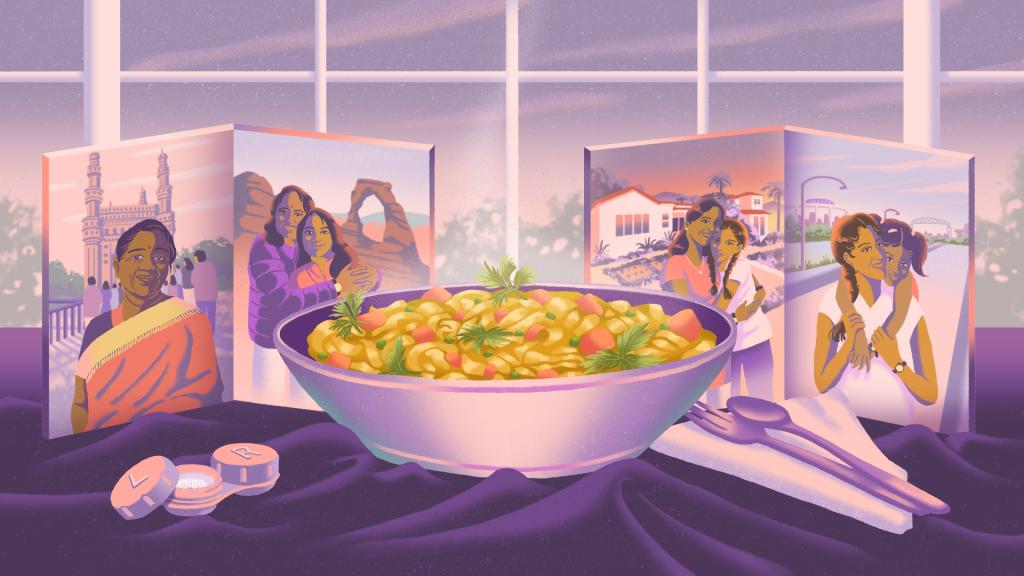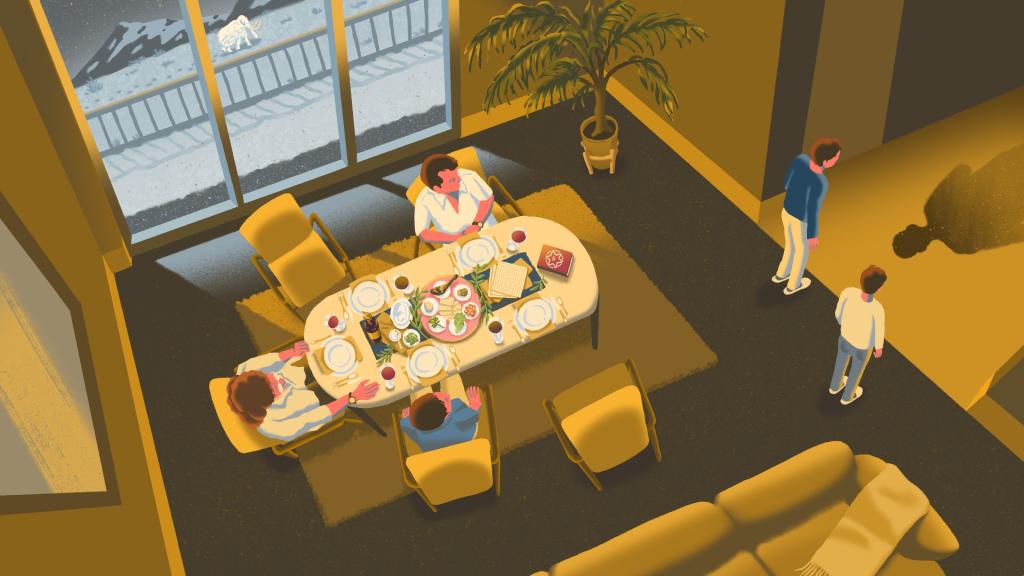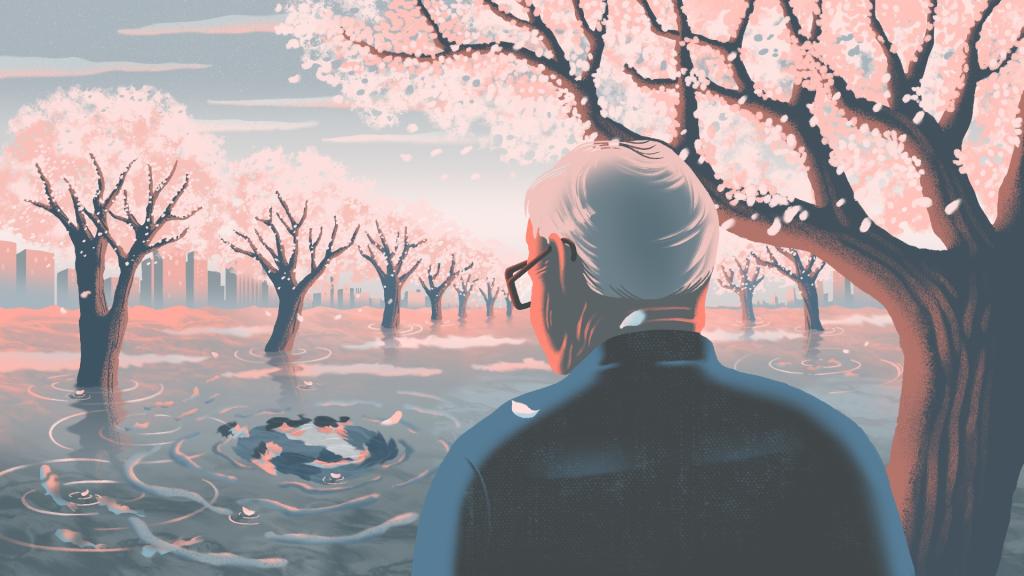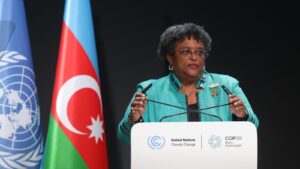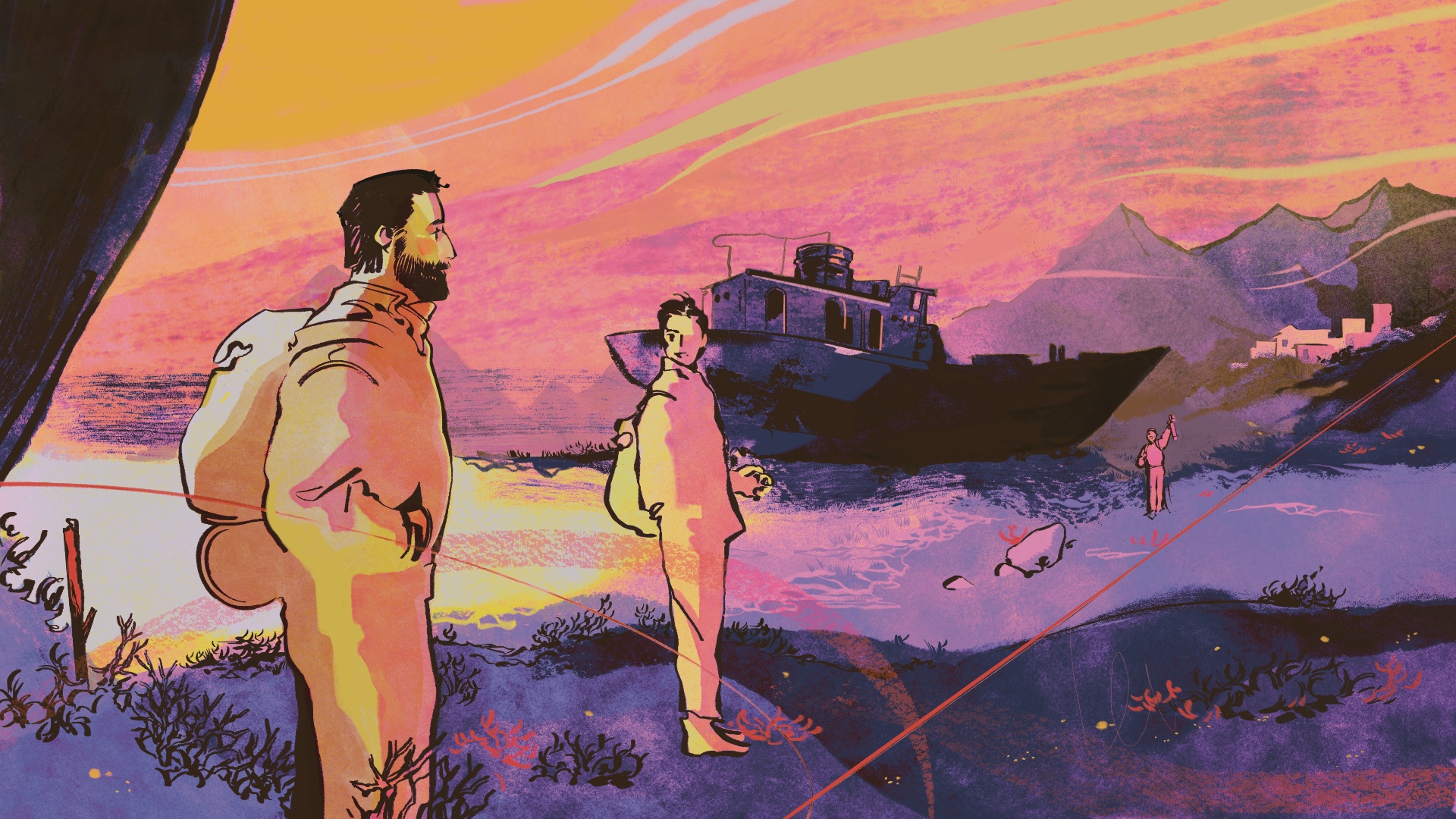
Imagine 2200, Grist’s climate fiction contest, celebrates stories that offer vivid, hope-filled, diverse visions of climate progress. Discover all the 2024 winners. Or sign up for email updates to get new stories in your inbox.
You must have not gone too far if you were able to find your way back.
-Kazakh proverb
| Aul | village |
| Dastarkhan | dinner table, feast |
| Toi | Feast |
| Beshparmak | Central Asian dish made from lamb, flat dough, and broth |
| Piala | Small ceramic bowl |
| Balam | My child |
| Zhuregim | My heart |
| Apa | Aunt, grandmother |
| Apam | My mother |
| Ağa | Uncle, older brother |
| Seksewil | A low thorny tree native in Aral |
Six years ago, Madina’s daughter left their home aul, Zholaman, by the North Aral Sea and never came back. In her stead, came a son.
Madina had always known that Aizhan was different. From the moment she had said her first word, she didn’t speak like any girl Madina had known. God plays funny tricks sometimes, doesn’t He? If God had made Aizhan this way, who was Madina to oppose His will?
When her son had returned home, he held his mother close, and she inhaled all the smells of the big city, and of changing times. He then opened his passport, held it up to his mother’s face and said, “My name is Zhan now.” And so Aizhan became Zhan. The moon had set but its soul remained. Madina took her son’s face in her bony, dark hands, and for the first time, she saw how much he looked like his father.
The next day, Madina prepared a dastarkhan to welcome home her son. She made deep-fried baursak, and they slaughtered a sheep to make beshparmak. The smells of meaty broth filled the dry saline air, reminding Madina of the tois their family used to throw, back when Zhan’s father was still alive. When they hadn’t yet buried their eldest son.
“Aren’t you going to invite our friends and neighbors, apam?” Zhan said, while he was stirring the meat in the boiling broth.
“Later, balam,” Madina said, keeping her eyes firmly on the dough she was kneading. “Today, I just want to have a nice meal with my son.”
“But what kind of toi are we going to have if there’s only the two of us?” Zhan said, laughing. “At least let me tell Mergen-ağa that his favorite troublemaker has come home. He’ll bring his wife and grandchildren.”
Wiping the flour off of her hands with her cotton apron, Madina said, “Mergen moved from Zholaman, balam. His son got a new job in Shymkent and took all his family with him.”
If Zhan was shocked or saddened by this news, he didn’t show it. He must have known it. Must have seen the ghostly streets of his home aul when he came back. People have been fleeing Zholaman, abandoning their homes, severing their roots. Madina didn’t blame them. She would’ve gone herself if she were even a decade younger.
There’s an old Kazakh proverb that says, “An onion can be sweeter than honey if it grows in your Motherland.” But in the dried-out basin of the old Aral Sea, honey tasted like salt, and onions tasted of nothing at all. The soil was saturated with salt and pesticides that were left behind as the sea dried out. And as the sea kept dying, so did the fishing auls around it.
Are you ashamed of me? Zhan seemed to be saying as the silence hung thick between them. Was Madina embarrassed to show her son to her friends and neighbors? No. But even as guilt was eating at her in that moment, Madina knew she was only trying to protect her son from evil eyes and venomous tongues. She could already hear the gossip at the regional bazaar, those no-good women like Karashash and Aitkanym spreading rumors about her Zhan, distorting the truth to plant seeds of anger and fear among their neighbors. If Zhan had come here to stay, he would have to face all those sins sooner or later. But today, Madina got her child back, and for this one day, she didn’t want to worry about his safety or his heart.
And yet, the dastarkhan was only half full. The emptiness left by Zhan’s father and brother felt even stronger with Zhan back at the family table, a harsh reminder that it was just the two of them now.
“You need to start looking for a job, balam,” Madina said, pouring the hot broth in her son’s red piala. “My pension is barely enough to feed just one mouth.”
“Don’t you worry about that, apam. I came back to Zholaman with a purpose,” he said, taking the full piala. “I’m going to help save the Aral.”
“Oi bai, zhuregim!” his mother burst out in laughter. “How are you going to do that? God himself couldn’t save the Aral if he wanted to.”
But her son didn’t say anything. He had that look in his eyes he would get when he was up to no good. He came from my flesh, I raised him. Then why does it feel like I don’t know my son at all?

When Zhan was young, he used to gather all the children in the aul and take them to the saline desert that was the shore. The children used to play on the ancient seabed and dig out fossilized mollusk shells from the hot sand, much to their parents’ disapproval. The children inhaled the saline air filled with dangerous remains of the pesticides, not knowing they were cutting their young lives short with each breath. But no amount of threats or punishment could keep them away from that strange barren landscape. “It made us feel like we were exploring an alien planet,” Zhan had explained to his mother once.
The price they had all paid for living so close to the Aral was high. Zhan’s childhood friend Tolganai died of throat cancer when she was 14. When Madina’s niece had her first baby, he died within weeks — killed, as the doctor had explained, by the toxins in his mother’s milk. Zhan’s older brother, Aidar, died the following year, after the pesticides got into his blood, altering his cells so much that they became the enemy to his own body. He was 18. What are you doing here, my boy? Madina thought, looking at her son.
Later that day, drawn by the smells of meat and jusai herb, Aidar’s two old friends came knocking. There was Eset, the grifter who spent most of his days hiding from his wife. And Erbol, who owned the only fishing boat left in the aul.
“What do you want, you devils?” Madina said, holding the door half open.
“Sälemetsyz-be, Madina-apa. How are you doing today?” Eset took off his baseball cap and bowed his big head.
“We heard that Zhan came to visit us yesterday. We just wanted to say hello,” Erbol said, smiling shyly.
But it wasn’t the boys eating all the beshparmak that the old woman was worried about. The very moment she had been putting off was here.
“Look, lads, it’s been a long day, Zhan is tired —”
“Who is it, apam?” Zhan came out into the hallway, and Madina had no choice but to open the door and let the guests in. You can’t hide him in his room forever.
Whatever reaction Madina was expecting, this was not it. Eset and Erbol seemed surprised to see the former object of their boyish fantasies stand before them as a grown man. There was curiosity, excited shouts, and not-so-polite appraisals of Zhan’s new appearance.
“So, you finally did it, you dumbass,” Eset said, shaking his head and patting Zhan on the back. “Took you long enough.”
“For your information, I did it two years ago, but I couldn’t tell you sooner because your mouth never closes.” Zhan laughed, but in those cheerful words was a silent accusation that stung Madina, even if it was unintentional. He had told his friends before telling his own mother. He didn’t want his mother to find out from a gossiping tongue. Who else knew the real Zhan before she did?
“You look very nice,” Erbol said, his eyes lingering on Zhan’s face. “Never pictured you with a beard, though.”
“You call that a beard?” Eset scoffed and pinched Zhan’s stubbled cheek. “You’re gonna have to try a little harder than that, brother.”
“Al, boldy! Dinner’s getting cold,” Madina ushered them back to the kitchen.
At the dastarkhan, Eset retrieved from his denim jacket a carefully concealed bottle of vodka. “So, what are we doing here, mourning the death of our sister or celebrating the birth of our brother?”
“Just pour the damn vodka, you idiot!” Erbol rolled his eyes.
Madina watched the three friends toast and down their shots in a bitter unison. And soon enough, for a brief moment, it did feel like she had her family back; the warmth of the air around the dinner table, the familiar laughter. Years ago, it was Aidar sitting where Zhan was sitting now, and the three childhood friends would spend hours planning their futures and boasting about their romantic escapades.
When Aidar died and Aizhan went to university, their friends were no longer regulars at Madina and her husband’s home, paying only guilty courtesy visits, spurred on by their parents. According to Kazakh tradition, when a family member dies, your friends and relatives must invite you for dinner for a full year. But who would invite Madina when the aul was almost deserted, a proverbial ghost town?
“Apam, we’re going for a walk. I need to walk this meat off.” Zhan kissed his mother on the cheek. “Don’t do the dishes. I’ll do them when I get back.”

But Zhan did not do the dishes when he got back like he promised.
He came home after midnight, drunk, with a feverish blush on his youthful face. So drunk he was that he had to be propped up by his two accomplices, who were not as drunk as their friend but were still laughing loudly and sweating like they’d just run a marathon.
Cursing and lamenting, Madina let the three musketeers in and made them all tea. Some things never change, she swore to herself, remembering when Zhan — still Aizhan then — would stay out late with her friends, driving her mother up the wall with worry. But what could Madina do? She couldn’t control her child any more than she could summon rain.
“What have you hoodlums been up to tonight? My son isn’t back one day, and you’re ruining him for me?” said Madina, unable to truly be angry. She poured strong black tea into four pialas.
“Don’t be mad at us, Madina-apa,” Eset cooed. “We’re so happy to have Zhan back. He’s gonna help us save the sea.”
“Is that so? And how are you going to do that, balam?” She couldn’t help the sarcastic remark.
“He’s going to catch fish with us,” Erbol offered under his breath.
“No, not catch fish. I’m gonna study the population of the sturgeon here in the North Aral,” Zhan slurred.
“That’s right, the professor here is gonna save our fishing industry with science,” Eset said and pounded Zhan on the back, almost making the other man choke on his tea.
“Not save,” Zhan said, wiping the tea from his face. “Study.” He shrugged in an attempt to appear nonchalant but looked much like his father when he would get himself in trouble.
“Why do you need to go out to sea to do your research? Why can’t you do it from land? You’re a scholar, not a fisherman. You’ve never even set your foot on a boat.”
“Please, apam, can we not do this tonight?” Zhan said, wincing. Had Madina not been so upset in that moment she would’ve seen that her son was hurting; that something was weighing on him, and that it wasn’t all the vodka he had been imbibing that evening. But how could Madina see anything besides her husband saying goodbye in the early morning to get to his fishing boat, and her knowing deep down, in the darkest corner of her soul, that he would not be coming back from this trip?
“Madina-apa, you should be happy that Zhan is trying to save the Aral. And we will take good care of him on our boat, I promise,” said Erbol, trying to smooth things over, but the tired old woman had heard enough.
“Boldy! No son of mine is killing himself sailing those polluted waters. Get out, you devils, before I call your wives. Gonna get my child killed with your drunk nonsense. Al, ket!”
After she had slammed the door behind the drunk bastards, she went back to the kitchen fully set on giving her son a piece of her mind, but Zhan was already gone.
“Zhan, balam?” But only the ticking of the clock answered her call.
Sighing, Madina sat back in her creaky old chair, put her hands over her face, and wept.

Dawn came, cold and gray. Eyes puffy and head heavy as if she herself had been drinking all night, Madina went to look for her son.
She found him on the naked shore by the carcass of an old trawler that had gone brown with rust. Zhan was a tall, thin figure standing in the sand, like a stork. That was what he had always reminded her of when he was little — a baby stork. Tall and lanky and awkward, never quite finding himself in his own skin. Madina knew why — now. God had made him this way. Was it God that had given him a restless heart too? Or was it his father’s blood in him, roiling, boiling, drawing him out to sea like an invisible tide? My son, she thought with tears welling up inside her again. My dear, beautiful boy.
She watched on in silence as Zhan, hungover and hurting, was surrendering himself to the saline wind, letting his shoulder-length hair fly. How he must have missed the Aral in all its salty, miserable dryness. He had lived in big cities all around the country and had traveled abroad, and his heart must have ached for the harsh winds of his homeland.
It looked from a distance like he was praying, or meditating, and Madina felt like a criminal intruding on a private moment. But he looked so small, so vulnerable against the vast gray desert, and she wanted to make herself big and stand between him and the toxic waters like a wall — to protect him from the small, vindictive minds that would no doubt try and hurt him.
A gust of wind blew in from the west, almost knocking Madina off her feet. Zhan must have heard her gasp or seen her stumble from the corner of his eye, for he was now running toward her, himself stumbling in the treacherous sand.
“Apam, what are you doing here?” he said, eyes full of unspoken hurt. “You already made it clear how you feel about me going out to sea.” There was a kind of finality in his words that told her that his mind had been made up.
“I just don’t understand, balam,” Madina sighed, dusting the sand off of her dress. “You have traveled all across the world, and you can go anywhere you want. Why come back to Zholaman?” Don’t you know that this place will never be what it once was?
As if having heard her unspoken question, Zhan said, “You don’t turn your back on a loved one because they have been abused. It’s the same with your home. You have seen the Aral in its prime, even if you don’t remember much of it. I haven’t. And I will never see it fully restored in my lifetime, but I have a chance to do something good here.”
Her eyes went over the naked seabed and the dry seksewil that was trembling in the wind, sand and salt stuck in its thorny branches. One of Madina’s earliest memories was of her father coming home from a fishing trip. Standing at the bow of his boat, tall and smelling of fish, he would haul up his daughter on board and she would drown in his strong, sunbaked embrace.
Her father would bring Aral trout and rudd, full nets of them. And sturgeon. Those terrifying fish with scales like dragons both frightened and excited the little girl.
Once the Soviet authorities directed the rivers that fed the Aral from the sea to irrigate the new cotton fields in Uzbekistan, starving the Aral of its life source, the sea began to shrink. Every day, the shoreline was getting farther and farther away from the auls, and the little water that was left became so saline that many fish died out. And each year, Madina’s father would bring home less and less fish, until he hung up his nets for good and started driving the water hauler to feed his family.
But now, some half a century later, things were starting to change. Little by little, the sea was starting to come back. Ever since they had built the Kökaral dike in 2005 in the north, their corner of the Aral Sea was making its slow, timid way home. That was when the first fishing boat sailed from the distant shore for the first time in what felt like a lifetime. It was Erbol’s boat, she remembered, and the young men had come back with sturgeon and rudd. She hadn’t seen this much fish since Aidar was a little boy.
“You have always been too good for this world, son. I don’t know if Zholaman deserves you” — or if I deserve you — “but I don’t want you to meet the same fate as your father.”
“Dad’s death was an accident, apam. It wasn’t the sea that had killed him. If his mate had fixed the engine like he was supposed to, they’d both be alive today.”
As the Aral was drying out, the fishermen of Zholaman had to go farther away from the familiar waters, staying out longer. When Madina had heard that the boat engine had exploded, killing the two-man crew, she didn’t want to believe it. If he had drowned during a storm, at least there’d be no one to blame but God himself. But it wasn’t God that had killed her husband. His death was a result of recklessness and laziness.
Madina also realized that this was the first time the two of them talked about Zhan’s father’s death since the accident. When they had held their final wake, on the one-year anniversary of his death, it felt like they had buried all the pain and grief with him. Madina should have been there for her son, and maybe if she had, he wouldn’t have left in the first place.

“I went to visit dad’s grave yesterday. And Aidar’s too.” Zhan said it so matter-of-factly that Madina didn’t immediately realize what it was he was saying. Women aren’t allowed in a Muslim cemetery, and it hadn’t occurred to Madina that Zhan could now visit his family grave.
“We should have left Zholaman ages ago,” she said, shaking her head, ”before we lost your father. Before your brother got sick.” It felt like a bitter kind of relief saying these words out loud. She had been blaming herself for all the misfortunes in silence, the guilt nestling itself deep inside her marrow. “Your father wanted to leave, but I was too afraid to start over.”
They had been making their way back home, feet sinking into the sand, the sun in their eyes promising them another hot day.
“It wasn’t your fault that Aidar died, apam.” Zhan said it with so much confidence that Madina almost believed him.
She took her son by the arm, half leaning on him for support and half guiding him home, her little stray lamb.
“Do you really think you can help save the Aral?”
“I’m just going to study the fish population, apam. All I can do is research, and hope that this research will help us understand how we can heal these waters. You know, there’s a theory that the Aral has always been growing and receding, because it depended on the rivers feeding it. But when the Soviets bled it dry to grow their cotton, they disrupted this natural cycle.”
“Can it … I don’t know, resume this natural cycle?”
“I don’t know. Maybe too much time has passed. Maybe too much damage has been done. And maybe the North and the South Aral will never be one again.” He bent down, picked up a white seashell from the ground, and blew sand from it. “And maybe we’re not meant to try and make it the way it was. With this new dike they built and with our research, we’re helping the Aral — helping ourselves transition to a state that is natural to the sea, and to us. One that is more true to who we are now.” He started laughing, and rubbed his neck, “I’m sorry, apam, I sound like a boring lecturer.”
Madina liked it when he talked about the sea and about them as if they were part of the Aral. She had lived in Zholaman her whole life. She had grown blind to its beauty, seeing only the seksewil and the dry sand. But Zhan, with his science, and his intuition, he was able to see something in this land that was worth saving, worth dedicating your life to. And if Zhan thought the Aral was worth saving, who was she to disagree with him?
Nothing is created fully formed, Madina thought to herself. Every living thing is in a constant process of change, transforming from one state to another. Zhan was right, the sea would probably never come back to what it once was and reclaim all its stolen territories. But it could still be something good. With a little help and a little love, it could come closer to its new true self.
Dinara Tengri (she/her) is a Kazakh-Swedish author, podcaster, and digital creator who lives in Malmö. Her short stories have been published in a Swedish anthology (Arkipelag) and Support for Indie Authors. Her record time for completing Prince of Persia 1989 is 29 minutes. She would like to dedicate this story to her old writing partner, Melissa Judson.
Molly Mendoza is an artist living in Portland, Oregon. Through their work, they explore the complex emotions of interpersonal relationships and self-love with a focus on layered visual storytelling, mark-making, and color. They write stories, they paint murals, they teach students, and they draw.
